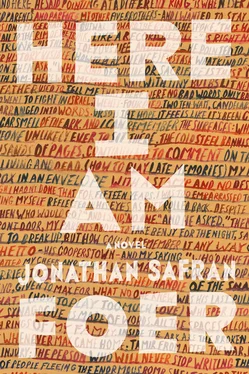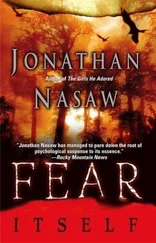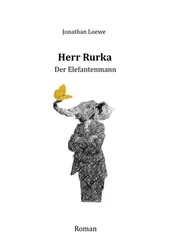The band members had assumed their positions, and forgoing any musical foreplay, went straight into “Dancing on the Ceiling.” The sea bass that was once in front of me no longer was; it must have been taken away. The glass of wine that was once in front of me no longer was; I must have drunk it.
The boys ran to the dance floor.
“I’ll slip out,” I told Julia.
“Islip,” she said.
“What?”
“Islip out.” And then: “I’m sorry. I didn’t—”
When we visited Masada, my father filled his pockets with rocks, and without knowing what he was doing, knowing only my need for his approval, I filled mine. Shlomo told us to put them back. It was the first time I’d ever heard him say no to one of us. He said that if everyone took a rock, Masada would be dispersed across mantels and bookshelves and coffee tables, and there would be no Masada. Even as a boy, I knew that was ridiculous — if anything is permanent, mountains are.
Islip out .
I walked to my car beneath a sky clotted with near-Earth objects.
Somewhere in the wedding guest book are my children’s signatures. They developed their handwriting on their own. But I gave them their names.
I parked out front with two wheels on the curb. I might not even have closed the front door behind me.
Here I am, writing in my half-buried office while my family is dancing.
How many synagogues did Sam end up building? Did any survive? Even a wall?
My synagogue is made of words. All the spaces allow it to shift when the ground moves. At the threshold of the sanctuary is the mezuzah, a doorframe nailed to the doorframe: the growth rings of my family. Inside the ark are the broken and the whole: Sam’s crushed hand, beside the hand that reached for his “I-know”; Argus lying in his own shit, beside the ever-panting tail-wagger who would pee as soon as Max entered the house; Tamir from after the war, beside Noam from before the war; my grandfather’s never-unbending knees, beside my kiss on his great-grandson’s nonexistent boo-boo; my father’s reflection in a mirror draped with black cloth, beside my sons falling asleep in the rearview mirror, beside the person who will never stop writing these words, who spent his life breaking his fists against the door of his synagogue, begging to be allowed in, beside the boy who dreamed of people fleeing the enormous bomb shelter for the safety of the world, the boy who would have realized that the heavy, heavy door opens outward, that I was inside the Holiest of Holies all along.
In the long aftermath of the destruction of Israel, Jacob moved into his new house. It was a nice, if slightly less nice, version of his old house: slightly lower ceilings; slightly less old and less wide planked floors; a kitchen with hardware that if it was called bespoke was called that by Home Depot; a bathtub that probably leached BPA, and was probably from Home Depot, but held water; melamine closets with nearly level shelves that performed their function and were nice enough; a faint, not-pleasant attic smell filling the atticless house; Home Depot doorknobs; middle-aged, rotting sub-Marvin windows that served as visual thresholds rather than as barriers against the elements or sound; walls wavy with uncharming trapped moisture; ominous peeling at the corners; subtly sadistic wall colors; unflush light switch plates; a faux-porcelain Home Depot vanity with wood-grained melamine drawers, in a bathroom the color of discharge, whose toilet paper roll was out of reach of anyone who wasn’t imported from Africa to dunk without jumping; ominous separation everywhere: between the molding components, between the crown molding and the ceiling, the floor molding and the floor, separation of the sink from the wall, the mantel of the nonfunctioning fireplace from the wall, the unflush electrical plates from the wall, the doorframes from the wall, the more-plastic-than-plastic Home Depot rosettes from the jaundiced ceiling, the floorboards from one another. It didn’t really matter, but it didn’t go unnoticed. He had to admit that he was more bourgeois than he’d have liked to admit, but he knew what was important. Those things were separating, too.
There was time, there was suddenly a life of it, and Jacob’s needs were taking the shape of his needs, rather than his ability to fulfill them. He was declaring his independence, and all of it — from the interminable wait for the hot-water Messiah to the unflush plate through which not enough threads of the cable nipple were exposed — filled him with hope. Or a version of hope. Jacob might have forced her hand, but it was Julia who chose the separation. And while his return from Islip could be understood as the claiming of an identity, it could at least as easily be understood as the forfeiture of one. So maybe he didn’t write his declaration of independence, but he was happy to sign it. It was a version of happiness.
Forty-two is young , he kept telling himself, like an idiot. He could hear his own idiocy loud and clear, and yet he couldn’t stop announcing it. He would remind himself of advances in medical technology, of his own efforts to eat less unhealthily, of the gym to which he had a membership (albeit ceremonial), and of that fact Sam had once shared: with each passing year, life expectancy increases by a year. Everyone who didn’t smoke would live to be one hundred. Practitioners of yoga would outlive Moses.
In time, his house would resemble his home — some rugs, better hardware, wall colors in keeping with the Geneva Convention, paintings and photos and lithos, calming lamplight, art books stacked on surfaces, throws not thrown but crisply folded and laid over sofas and chairs, maybe a wood-burning stove in the corner. And in time, everything that was possible would be actual. He’d get a girlfriend, or not. Buy an unexpected car, or probably not. Finally do something with the television show he’d been emptying his soul into for more than a decade. (The soul being the only thing that requires dispersal to accumulate.) Now that he no longer needed to protect his grandfather, he’d stop writing the bible and get back to the show itself. He’d take it to one of those producers who used to be interested in what he was doing, back when he was doing things that could be shared. A lot of time had passed, but they’d still remember him.
There had been more than one reason to keep the pages in a drawer — he wasn’t only protecting others. But once there was nothing left to lose, even Julia would see that the show wasn’t an escape from the challenges of family life, but a redemption of his family’s destruction.
Israel wasn’t destroyed —at least not in the literal sense. It remained a Jewish country, with a Jewish army, and borders only negligibly different from before the earthquake. Infinite debate corkscrewed the question of whether those new borders were good for the Jews . Although, tellingly, the expression most often used by American Jews was good for the Israelis . And that , the Israelis thought, was bad for the Jews.
Israel had been made weaker, but its enemies were made weaker still. Not much comfort can be taken, when sifting through your rubble with a bulldozer, in the knowledge that your enemy is sifting through his rubble by hand. But some comfort can be taken. As Isaac would have said, “It could be worse.” No, he would have said, “It is worse.”
Maybe he was right. Maybe it was worse to have survived, if continuing to be required destroying the reason to be. It’s not as if American Jews stopped caring. They continued to vacation and bar mitzvah and find themselves in Israel. They winced as their small cuts were first touched by Dead Sea water, winced as their hearts were first touched by “Hatikvah,” crammed folded wishes between the rubble of the Wailing Wall, recounted back-alley hummus spots, recounted the thrill of distant rocket strikes, winced as their eyes were first touched by the sun at Masada, recounted the perpetual thrill of seeing Jewish garbagemen, and Jewish firefighters, and Jewish homeless. But the feeling of having arrived, of finally finding a place of comfort, of being home , was disappearing.
Читать дальше












